人教版(2019) 必修第三册 Unit 2 Morals and Virtues 听说课课件(36张)
文档属性
| 名称 | 人教版(2019) 必修第三册 Unit 2 Morals and Virtues 听说课课件(36张) |
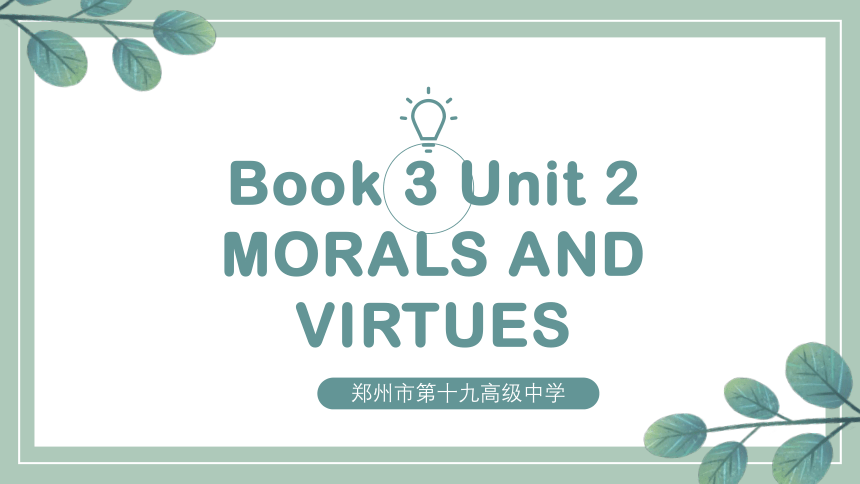
|
|
| 格式 | pptx | ||
| 文件大小 | 13.3MB | ||
| 资源类型 | 教案 | ||
| 版本资源 | 人教版(2019) | ||
| 科目 | 英语 | ||
| 更新时间 | 2022-05-05 16:54:37 | ||
图片预览

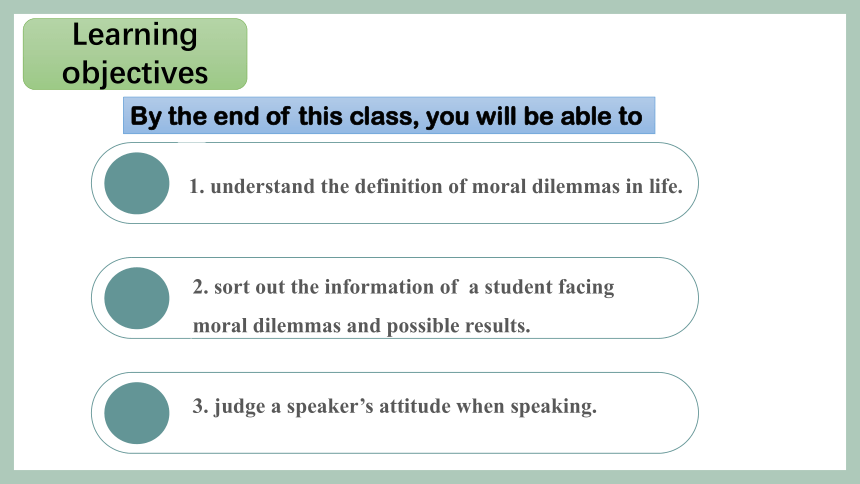
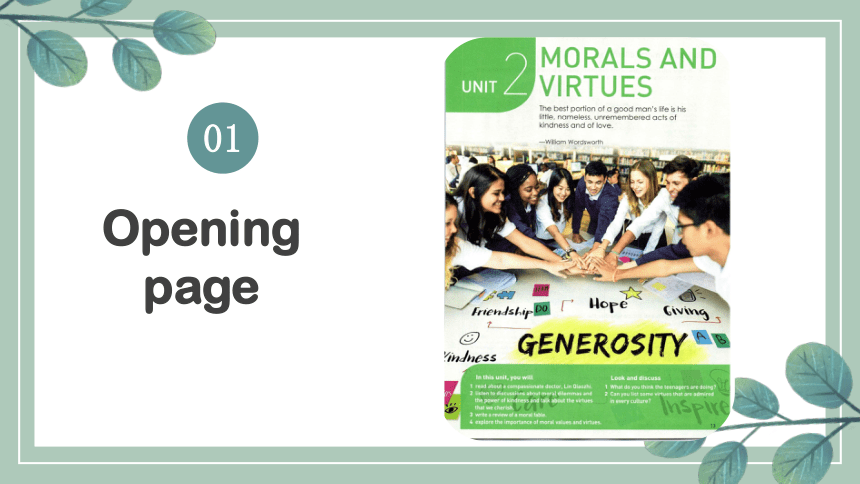
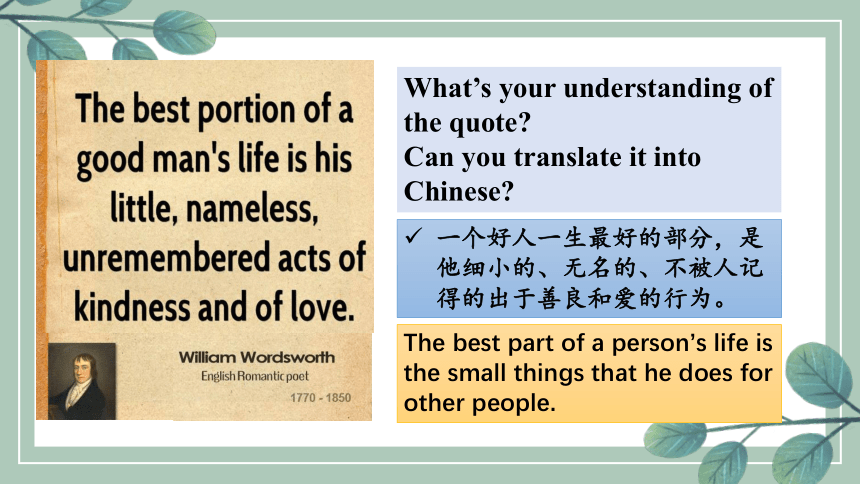
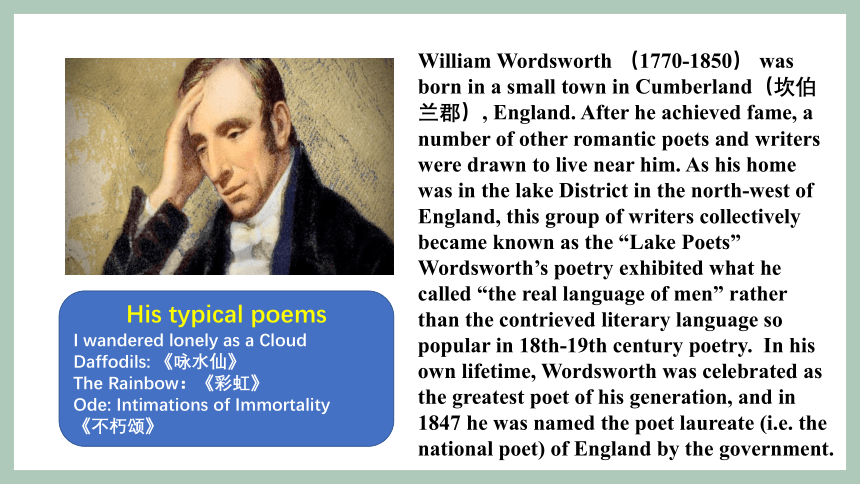

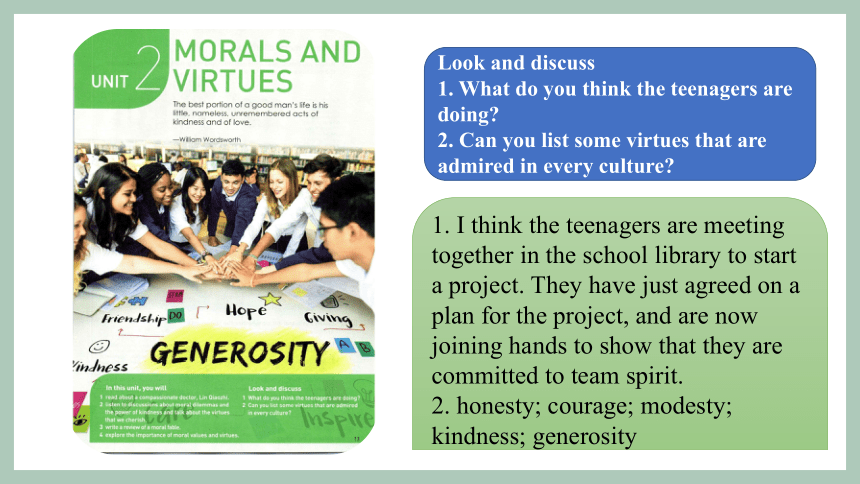
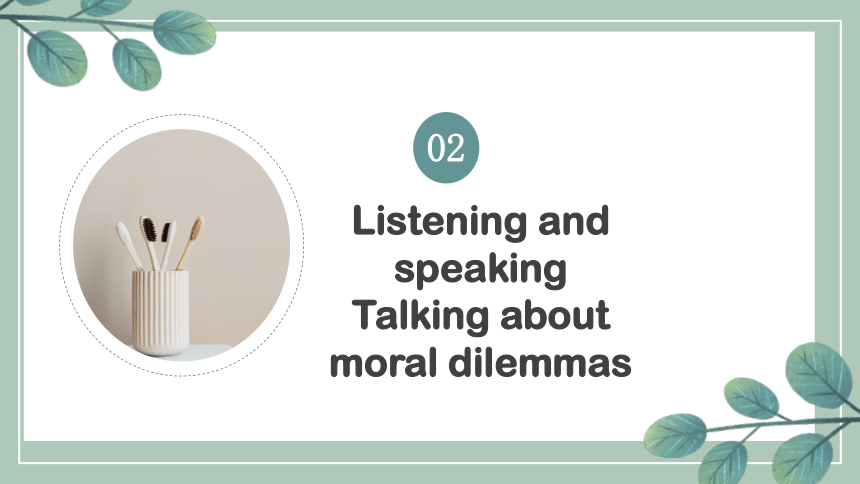
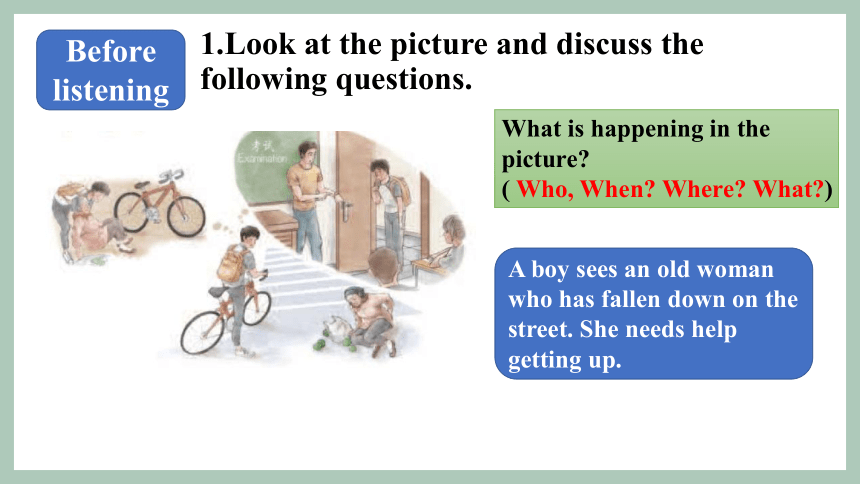
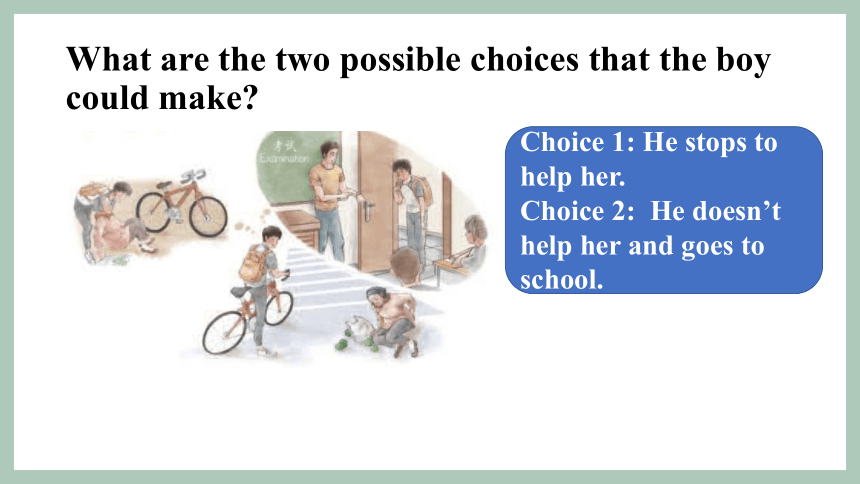

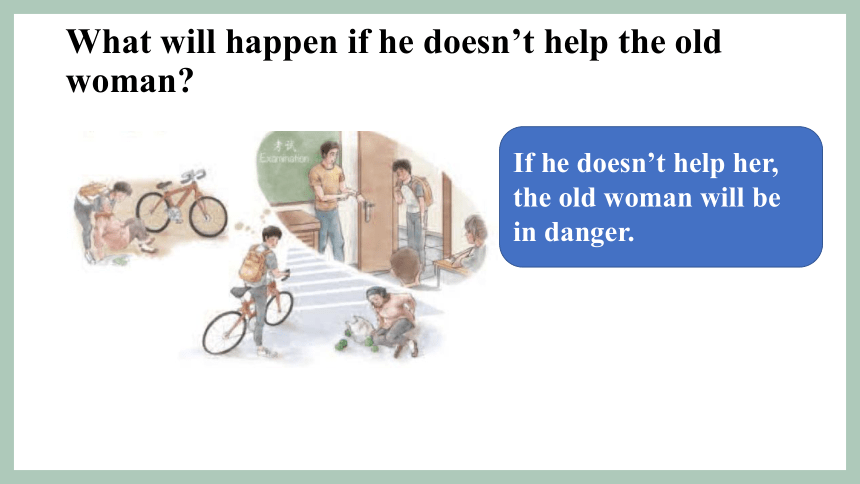
文档简介
(共36张PPT)
郑州市第十九高级中学
Book 3 Unit 2 MORALS AND VIRTUES
1. understand the definition of moral dilemmas in life.
2. sort out the information of a student facing moral dilemmas and possible results.
3. judge a speaker’s attitude when speaking.
By the end of this class, you will be able to
Learning objectives
01
Opening
page
What’s your understanding of the quote
Can you translate it into Chinese
一个好人一生最好的部分,是他细小的、无名的、不被人记得的出于善良和爱的行为。
The best part of a person’s life is the small things that he does for other people.
William Wordsworth (1770-1850) was born in a small town in Cumberland(坎伯兰郡), England. After he achieved fame, a number of other romantic poets and writers were drawn to live near him. As his home was in the lake District in the north-west of England, this group of writers collectively became known as the “Lake Poets” Wordsworth’s poetry exhibited what he called “the real language of men” rather than the contrieved literary language so popular in 18th-19th century poetry. In his own lifetime, Wordsworth was celebrated as the greatest poet of his generation, and in 1847 he was named the poet laureate (i.e. the national poet) of England by the government.
His typical poems
I wandered lonely as a Cloud
Daffodils: 《咏水仙》
The Rainbow:《彩虹》
Ode: Intimations of Immortality
《不朽颂》
Drinking Alone with the Moon
I wandered lonely as a cloud
That floats on high o'er vales and hills,
When all at once I saw a crowd,
A host,of golden daffodils;
Beside the lake,beneath the trees,
Fluttering and dancing in the breeze.
我孤独的漫游,像一朵云
在山丘和谷地上飘荡
忽然见我看见一群
金色的水仙花迎春开放在树荫下,在湖水边
迎着微风起舞翩翩
Look and discuss
1. What do you think the teenagers are doing
2. Can you list some virtues that are admired in every culture
1. I think the teenagers are meeting together in the school library to start a project. They have just agreed on a plan for the project, and are now joining hands to show that they are committed to team spirit.
2. honesty; courage; modesty; kindness; generosity
02
Listening and speaking
Talking about
moral dilemmas
1.Look at the picture and discuss the following questions.
What is happening in the picture
( Who, When Where What )
A boy sees an old woman who has fallen down on the street. She needs help getting up.
Before listening
What are the two possible choices that the boy could make
Choice 1: He stops to help her.
Choice 2: He doesn’t help her and goes to school.
What will happen if he helps the old woman
If he stops to help her, he might be late for school and get scolded by his teacher.
What will happen if he doesn’t help the old woman
If he doesn’t help her, the old woman will be in danger.
If you were the boy, what should you do and what would you do
I believe most of you will make the right choice.
A moral dilemma
A moral dilemma is a situation in which you have two or three difficult choices to make. If you choose one, you might get in trouble for not choosing the other(s).
道德困境
Have you ever faced a moral dilemma or heard of someone who did Describe it.
I once saw my friend cheat on a test. I knew that I should report him, but if I did, he would no longer be my friend.
Listen to the conversation and complete the table to describe the moral dilemma that Jane is talking about.
While listening
Situation The girl is taking the entrance examination for _________________________ in Beijing. During the exam, the student next to her fainted.
The girl’s choices She can _______________. or
She can ____________________.
Possible results ______________________________________, but ____________________________________. ____________________________________________________________, but ____________________________________________.
Listen to the conversation and complete the table to describe the moral dilemma that Jane is talking about.
While listening
Situation The girl is taking the entrance examination for _________________________ in Beijing. During the exam, the student next to her fainted.
The girl’s choices She can _______________. or She can
____________________.
Possible results ______________________________, but ____________________________________. ____________________________________________________________, but ____________________________________________.
a famous medical university
finish the exam
stop and help the girl
She will get into medical university
the girl might not get the help she needs
She can put the needs of the other person first
give up her chance to get into the medical university
3.Listen again and decide whether the statements are T or F.
1. Jane is eager to share the magazine article with Luke.
2. Luke doubts that young people face moral dilemmas all the time.
3. Jane admires what the girl in the story did.
4. Luke doesn’t believe anybody would do what the girl in the story did.
5. Jane wonders how the girl became a doctor later.
3.Listen again and decide whether the statements are T or F.
1. Jane is eager to share the magazine article with Luke.
2. Luke doubts that young people face moral dilemmas all the time.
3. Jane admires what the girl in the story did.
4. Luke doesn’t believe anybody would do what the girl in the story did.
5. Jane wonders how the girl became a doctor later.
T
T
T
T
F
4. Listen to the conversation carefully and answer the questions.
1 What did the girl do to help the student
2 What was the girl's name What was she famous for
3 What did Jane say about the girl's life
1 What did the girl do to help the student
She carried the student to a safe place and looked after her. Then she went to the hospital with the student and called her sister.
2 What was the girl's name What was she famous for
Her name was Lin Qiaozhi. She later became a great doctor. She was famous for caring for tens of thousands of women and their babies.
3 What did Jane say about the girl's life
Her life was full of hard choices but she didn't let them stop her from taking care of people who were in need. She always cared for others more than for herself.
Luke: Hi Jane! What are you reading
Jane: Oh, hey, Luke! I’m reading a very interesting magazine article about moral dilemmas.
Luke: Moral dilemma What do you mean
Jane: You know, it's when you have two choices, and you have to choose one, but for moral reasons sometimes it could be really difficult to decide.
Luke: Oh, situations like that don’t happen very often, do they
听力原文
Jane: Actually, I think people face moral dilemmas all
the time, even us students.
Luke: Really Like what
Jane: Well, for example, it mentions a girl who was taking the entrance exam for a medical university in Beijing. During the exam, the student next to her fainted. The girl had a choice. Should she finish the exam or should she stop and help the student
Luke: Surely the teachers would look after the student who fainted!
Jane: Well, that’s what I thought—but not this girl. She stopped to help the student, thinking that it was better to put the needs of the other person first.
Luke: So what happened to her exam
Jane: She never finished it. Instead, she carried the student to a safe place and looked after her. Then she went to the hospital with the student and called her sister.
Luke: I can’t believe she would give up her chance to get into medical university! Who would do such a thing
Jane: Well, that girl was Lin Qiaozhi. She later did get into medical university and then she became a great doctor. She became famous for caring for tens of thousands of women and their babies.
Luke: Oh, wow! So she became a doctor even though she left her exam that day!
Jane: Yes. Her life was full of hard choices, but she didn’t let them stop her from taking care of people who were in need. She always cared for others more than for herself.
5.Talk about what you would do if you were ever faced with the same situation as the girl.
A:If I were ever in a situation like the one the girl faced, I think I would choose to ...
B:Why Are you sure
A:Because I think that ... is most important. What about you
B:I think I would ...
Post listening
EXAMPLE
03
Pronunciation
1. Listen to the conversation and match each rising intonation with its meaning.
1). A: You know Angela
B: ↗Yes.
2). A: You volunteer at the local
shelter, ↗don’t you
B: Yes. It’s a great experience.
3). A: Did you hear that James helped an old woman who fell down while crossing the street
B: Yes. It was a bit ↗dangerous, but he got all the cars to stop.
2. Read the conversation and mark↗the correct places. Then listen to the recording to check. Notice the meaning of each rising intonation.
Peter: It's a nice day, isn't it
Nick: Yes, but it looks gloomy to me.
Peter: Why What happened
Nick: You know ↗Tony
Peter: ↗Yes.
Nick: He asked me to write an essay for him. But I don't think it's the right thing to do. ↗Do you
Peter: No, it's not.
Nick: But I'm afraid to lose him as a friend.
Peter:Well, good friends should help each other. But it doesn't mean you should help him cheat! Why not help him with his ↗schoolwork
Nick: Good idea!
Pronunciation
Pronunciation
本单元语音部分主要学习和巩固英语的基本语调之一:升调。英语中的升调是一种相当复杂的语音现象,它既可以用来表示说话人对所说的内容不肯定、表达的意意思不完整、所说内容未结束或准备继续与对方保持对话,也可表示疑问、惊讶、怀疑、犹豫、兴趣、不自信、没有安全感等情绪,还可表示礼貌、请求、建议等。在英语口语中,最常见中的的使用升调的情况有:
用法 例句
1. 用于一般疑问句 Have you read this book
Do you like the movie
2. 用于选择疑问句的前半部分(即or 之前的选项) Does he speak English or French
Would you like tea or coffee
3. 用于置于句首的状语短语或状语从句 If it rains tomorrow, I’ll stay at home.
According to her words, she met that man at the cinema.
4. 用于并列句的第一个分句,表示句子未说完 The telephone rang, but nobody answered it.
He heard a crash and went out to see what had happened.
英语口语升调用法表
用法 例句
5. 用于呼唤对方 Sir, you dropped your car key.
Goodbye, Tom.
6. 用于列举事物 One, two, three, four, five.
She bought bread, milk, potatoes and tomatoes.
7. 用于委婉的祈使句 Don’t worry.
Wait a moment.
8. 用于反意疑问句的后半部分,表示不确定的态度或征求对方的看法。 You don’t speak Cantonese, do you
9. 高升调(high rise) 用于疑问句中表达强烈的惊讶或难以置信的情绪。 ---I’m really sorry, but I probably lost your ticket.
--- What You lost my ticket
Homework
1. Make a dialogue with your partner about a moral dilemma.
2. Read the conversation on Page 15.
Thank you
郑州市第十九高级中学
Book 3 Unit 2 MORALS AND VIRTUES
1. understand the definition of moral dilemmas in life.
2. sort out the information of a student facing moral dilemmas and possible results.
3. judge a speaker’s attitude when speaking.
By the end of this class, you will be able to
Learning objectives
01
Opening
page
What’s your understanding of the quote
Can you translate it into Chinese
一个好人一生最好的部分,是他细小的、无名的、不被人记得的出于善良和爱的行为。
The best part of a person’s life is the small things that he does for other people.
William Wordsworth (1770-1850) was born in a small town in Cumberland(坎伯兰郡), England. After he achieved fame, a number of other romantic poets and writers were drawn to live near him. As his home was in the lake District in the north-west of England, this group of writers collectively became known as the “Lake Poets” Wordsworth’s poetry exhibited what he called “the real language of men” rather than the contrieved literary language so popular in 18th-19th century poetry. In his own lifetime, Wordsworth was celebrated as the greatest poet of his generation, and in 1847 he was named the poet laureate (i.e. the national poet) of England by the government.
His typical poems
I wandered lonely as a Cloud
Daffodils: 《咏水仙》
The Rainbow:《彩虹》
Ode: Intimations of Immortality
《不朽颂》
Drinking Alone with the Moon
I wandered lonely as a cloud
That floats on high o'er vales and hills,
When all at once I saw a crowd,
A host,of golden daffodils;
Beside the lake,beneath the trees,
Fluttering and dancing in the breeze.
我孤独的漫游,像一朵云
在山丘和谷地上飘荡
忽然见我看见一群
金色的水仙花迎春开放在树荫下,在湖水边
迎着微风起舞翩翩
Look and discuss
1. What do you think the teenagers are doing
2. Can you list some virtues that are admired in every culture
1. I think the teenagers are meeting together in the school library to start a project. They have just agreed on a plan for the project, and are now joining hands to show that they are committed to team spirit.
2. honesty; courage; modesty; kindness; generosity
02
Listening and speaking
Talking about
moral dilemmas
1.Look at the picture and discuss the following questions.
What is happening in the picture
( Who, When Where What )
A boy sees an old woman who has fallen down on the street. She needs help getting up.
Before listening
What are the two possible choices that the boy could make
Choice 1: He stops to help her.
Choice 2: He doesn’t help her and goes to school.
What will happen if he helps the old woman
If he stops to help her, he might be late for school and get scolded by his teacher.
What will happen if he doesn’t help the old woman
If he doesn’t help her, the old woman will be in danger.
If you were the boy, what should you do and what would you do
I believe most of you will make the right choice.
A moral dilemma
A moral dilemma is a situation in which you have two or three difficult choices to make. If you choose one, you might get in trouble for not choosing the other(s).
道德困境
Have you ever faced a moral dilemma or heard of someone who did Describe it.
I once saw my friend cheat on a test. I knew that I should report him, but if I did, he would no longer be my friend.
Listen to the conversation and complete the table to describe the moral dilemma that Jane is talking about.
While listening
Situation The girl is taking the entrance examination for _________________________ in Beijing. During the exam, the student next to her fainted.
The girl’s choices She can _______________. or
She can ____________________.
Possible results ______________________________________, but ____________________________________. ____________________________________________________________, but ____________________________________________.
Listen to the conversation and complete the table to describe the moral dilemma that Jane is talking about.
While listening
Situation The girl is taking the entrance examination for _________________________ in Beijing. During the exam, the student next to her fainted.
The girl’s choices She can _______________. or She can
____________________.
Possible results ______________________________, but ____________________________________. ____________________________________________________________, but ____________________________________________.
a famous medical university
finish the exam
stop and help the girl
She will get into medical university
the girl might not get the help she needs
She can put the needs of the other person first
give up her chance to get into the medical university
3.Listen again and decide whether the statements are T or F.
1. Jane is eager to share the magazine article with Luke.
2. Luke doubts that young people face moral dilemmas all the time.
3. Jane admires what the girl in the story did.
4. Luke doesn’t believe anybody would do what the girl in the story did.
5. Jane wonders how the girl became a doctor later.
3.Listen again and decide whether the statements are T or F.
1. Jane is eager to share the magazine article with Luke.
2. Luke doubts that young people face moral dilemmas all the time.
3. Jane admires what the girl in the story did.
4. Luke doesn’t believe anybody would do what the girl in the story did.
5. Jane wonders how the girl became a doctor later.
T
T
T
T
F
4. Listen to the conversation carefully and answer the questions.
1 What did the girl do to help the student
2 What was the girl's name What was she famous for
3 What did Jane say about the girl's life
1 What did the girl do to help the student
She carried the student to a safe place and looked after her. Then she went to the hospital with the student and called her sister.
2 What was the girl's name What was she famous for
Her name was Lin Qiaozhi. She later became a great doctor. She was famous for caring for tens of thousands of women and their babies.
3 What did Jane say about the girl's life
Her life was full of hard choices but she didn't let them stop her from taking care of people who were in need. She always cared for others more than for herself.
Luke: Hi Jane! What are you reading
Jane: Oh, hey, Luke! I’m reading a very interesting magazine article about moral dilemmas.
Luke: Moral dilemma What do you mean
Jane: You know, it's when you have two choices, and you have to choose one, but for moral reasons sometimes it could be really difficult to decide.
Luke: Oh, situations like that don’t happen very often, do they
听力原文
Jane: Actually, I think people face moral dilemmas all
the time, even us students.
Luke: Really Like what
Jane: Well, for example, it mentions a girl who was taking the entrance exam for a medical university in Beijing. During the exam, the student next to her fainted. The girl had a choice. Should she finish the exam or should she stop and help the student
Luke: Surely the teachers would look after the student who fainted!
Jane: Well, that’s what I thought—but not this girl. She stopped to help the student, thinking that it was better to put the needs of the other person first.
Luke: So what happened to her exam
Jane: She never finished it. Instead, she carried the student to a safe place and looked after her. Then she went to the hospital with the student and called her sister.
Luke: I can’t believe she would give up her chance to get into medical university! Who would do such a thing
Jane: Well, that girl was Lin Qiaozhi. She later did get into medical university and then she became a great doctor. She became famous for caring for tens of thousands of women and their babies.
Luke: Oh, wow! So she became a doctor even though she left her exam that day!
Jane: Yes. Her life was full of hard choices, but she didn’t let them stop her from taking care of people who were in need. She always cared for others more than for herself.
5.Talk about what you would do if you were ever faced with the same situation as the girl.
A:If I were ever in a situation like the one the girl faced, I think I would choose to ...
B:Why Are you sure
A:Because I think that ... is most important. What about you
B:I think I would ...
Post listening
EXAMPLE
03
Pronunciation
1. Listen to the conversation and match each rising intonation with its meaning.
1). A: You know Angela
B: ↗Yes.
2). A: You volunteer at the local
shelter, ↗don’t you
B: Yes. It’s a great experience.
3). A: Did you hear that James helped an old woman who fell down while crossing the street
B: Yes. It was a bit ↗dangerous, but he got all the cars to stop.
2. Read the conversation and mark↗the correct places. Then listen to the recording to check. Notice the meaning of each rising intonation.
Peter: It's a nice day, isn't it
Nick: Yes, but it looks gloomy to me.
Peter: Why What happened
Nick: You know ↗Tony
Peter: ↗Yes.
Nick: He asked me to write an essay for him. But I don't think it's the right thing to do. ↗Do you
Peter: No, it's not.
Nick: But I'm afraid to lose him as a friend.
Peter:Well, good friends should help each other. But it doesn't mean you should help him cheat! Why not help him with his ↗schoolwork
Nick: Good idea!
Pronunciation
Pronunciation
本单元语音部分主要学习和巩固英语的基本语调之一:升调。英语中的升调是一种相当复杂的语音现象,它既可以用来表示说话人对所说的内容不肯定、表达的意意思不完整、所说内容未结束或准备继续与对方保持对话,也可表示疑问、惊讶、怀疑、犹豫、兴趣、不自信、没有安全感等情绪,还可表示礼貌、请求、建议等。在英语口语中,最常见中的的使用升调的情况有:
用法 例句
1. 用于一般疑问句 Have you read this book
Do you like the movie
2. 用于选择疑问句的前半部分(即or 之前的选项) Does he speak English or French
Would you like tea or coffee
3. 用于置于句首的状语短语或状语从句 If it rains tomorrow, I’ll stay at home.
According to her words, she met that man at the cinema.
4. 用于并列句的第一个分句,表示句子未说完 The telephone rang, but nobody answered it.
He heard a crash and went out to see what had happened.
英语口语升调用法表
用法 例句
5. 用于呼唤对方 Sir, you dropped your car key.
Goodbye, Tom.
6. 用于列举事物 One, two, three, four, five.
She bought bread, milk, potatoes and tomatoes.
7. 用于委婉的祈使句 Don’t worry.
Wait a moment.
8. 用于反意疑问句的后半部分,表示不确定的态度或征求对方的看法。 You don’t speak Cantonese, do you
9. 高升调(high rise) 用于疑问句中表达强烈的惊讶或难以置信的情绪。 ---I’m really sorry, but I probably lost your ticket.
--- What You lost my ticket
Homework
1. Make a dialogue with your partner about a moral dilemma.
2. Read the conversation on Page 15.
Thank you
